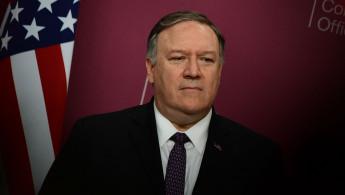President Donald Trump's administration pushed back the plan after Israel unexpectedly headed back to new elections to be held September 17 and fresh questions arose on Thursday when Jason Greenblatt, Trump's adviser on the Middle East, resigned.
But Pompeo, responding to a question at Kansas State University, dismissed speculation of a substantial new delay.
"We've been consulting broadly throughout the region for two and a half years now and I think in the coming weeks we'll announce our vision," Pompeo said.
"And hopefully the world... will see that as a building block, a basis on which to move forward," he said.
He called Middle East peace "a difficult problem, one that ultimately those two peoples will have to resolve for themselves, but we've worked hard on that."
The Palestinian Authority has cut off formal contact with the Trump administration, saying it is not an honest broker after taking a series of unabashedly pro-Israel decisions such as recognising Jerusalem as the capital of the Jewish state.
The administration has started to describe its upcoming proposal as a "vision" rather than a plan, leading observers to wonder if Washington will offer more of a statement of principles rather than seek to broker a major agreement.
Trump's adviser and son-in-law Jared Kushner launched the administration's peace initiative in June with a conference in Bahrain in which he dangled $50 billion in investment for the region if the Palestinians agree on a political deal.
The Palestinian leadership boycotted the conference, accusing the administration of ignoring key political issues and trying to buy its acceptance of Israeli rule.
Kushner has repeatedly said that a political component of the peace plan was in the pipeline.
Greenblatt cited personal reasons in leaving, with the father of six saying he wanted to spend more time with his family.
Follow us on Twitter: @The_NewArab





 Follow the Middle East's top stories in English at The New Arab on Google News
Follow the Middle East's top stories in English at The New Arab on Google News
![The UAE is widely suspected of arming the RSF militia [Getty]](/sites/default/files/styles/image_330x185/public/2024-11/GettyImages-472529908.jpg?h=69f2b9d0&itok=Yauw3YTG)
![Netanyahu furiously denounced the ICC [Getty]](/sites/default/files/styles/image_330x185/public/2024-11/GettyImages-2169352575.jpg?h=199d8c1f&itok=-vRiruf5)
![Both Hamas and the Palestinian Authority welcomed the ICC arrest warrants [Getty]](/sites/default/files/styles/image_330x185/public/2024-11/GettyImages-2178351173.jpg?h=199d8c1f&itok=TV858iVg)